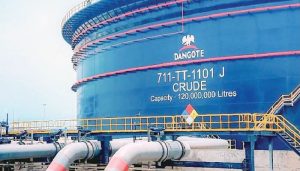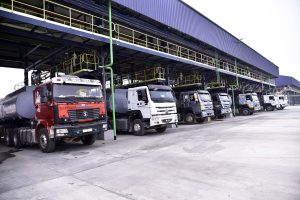Dangote Refinery Pushes Back and Counters NUPENG Claims and Allegations; Reaffirms Job Creation, Market Stability and Energy Transition Role in Nigeria’s Future

In Lagos-Nigeria, Africa’s largest refinery has pushed back against allegations from Nigeria’s most powerful oil workers’ union, underscoring its role as both an engine of job creation and a cornerstone of Nigeria’s energy transition.
The Dangote Petroleum Refinery, commissioned just over a year ago, rejected claims by the Nigeria Union of Petroleum and Natural Gas Workers (NUPENG) that it was stifling workers’ rights and positioning itself as a monopoly. In a detailed statement on Thursday, the company instead portrayed itself as a national asset, one that is reshaping Nigeria’s energy sector, strengthening infrastructure, and opening new economic frontiers.

At the heart of the clash lies an uneasy balance between labour protections and the country’s hunger for energy security. NUPENG accused the refinery of union suppression and warned against policies that could sideline workers in the name of efficiency. Dangote countered, insisting employees are free to join recognised trade unions and that no coercion has taken place.
Industry analysts say the dispute reflects a wider tension: how to reconcile Nigeria’s long-standing dependence on labour-intensive petroleum logistics with the automation, efficiency, and green energy pivots that the refinery represents.
Since operations began, Dangote’s refinery has altered Nigeria’s energy landscape. It slashed diesel prices by more than 30%, stabilized petrol supply, and helped turn Nigeria into a net exporter of refined fuels for the first time in decades. By cutting reliance on costly fuel imports, it has relieved pressure on foreign exchange reserves, giving the naira some breathing space amid turbulent markets.
Critics worry that such dominance could evolve into market control. Dangote insists otherwise, citing the deregulated nature of Nigeria’s downstream sector and pointing to other refinery projects in development. Far from monopolistic, it argues, its entry has revitalized competition and forced traders to adjust pricing.

The company also highlights its broader economic footprint. Beyond refining, Dangote has financed roads, housing schemes, and port upgrades around its Lekki base, providing essential infrastructure that supports both government and private sector growth. Its compressed natural gas (CNG) initiative, valued at N720 billion, involves rolling out thousands of gas-powered trucks. This is a move the company insists will create over 60,000 direct jobs while supporting Nigeria’s net-zero goals.
This real estate and infrastructure drive ties into government service delivery: new housing, worker estates, and transport corridors are expanding around refinery-linked hubs, reshaping Lagos’ urban geography.
The refinery’s operations ripple far beyond energy prices for ordinary Nigerians. Cheaper fuel eases transportation costs, lowers food prices and provides relief to families battling inflation. Jobs ranging from truck drivers and engineers to housing contractors and service providers, creating new opportunities for upward mobility.
However, unions remain wary that efficiency-driven reforms, especially in CNG adoption, could leave traditional fuel handlers behind. Labour leaders stress that social equity must remain central as Nigeria shifts from petrol and diesel toward cleaner alternatives.
Politically, the refinery carries enormous weight. To President Bola Tinubu’s administration, it is a flagship symbol of industrial revival-proof that private investment can complement state-led economic recovery. Diplomatically, the refinery bolsters Nigeria’s standing in West Africa, where cheaper exports are already undercutting black-market smuggling and stabilising supply in neighbouring states.
In its statement, Dangote emphasised its cordial relations with workers and unions, urging NUPENG to “engage in constructive dialogue” rather than escalate confrontation. Analysts note that how this dialogue unfolds could set precedents for labour relations in Nigeria’s broader energy transition, particularly as renewables, gas and refining increasingly intersect.

In just over a year, the Dangote Refinery has created more than 570,000 direct and indirect jobs, expanded Nigeria’s industrial base and positioned the country as Africa’s refining hub. Its executives insist this trajectory is not about control but about building resilience: “Our operations are designed to strengthen Nigeria’s economy, create decent jobs, and support the global shift toward cleaner fuels.”
At the moment, the refinery embodies both promise and controversy: a beacon of industrial might that could either unite government, business and labour around shared goals, or widen fault lines in Nigeria’s struggle for inclusive growth.






